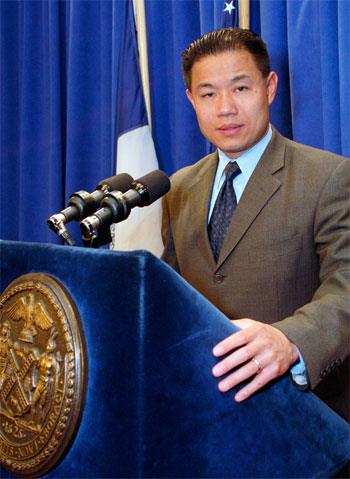

LIU WARNS OF TOP 10 FISCAL CHALLENGES FACING NYC, IN 'STATE OF THE CITY' ADDRESS
New York City Comptroller John C. Liu outlined the top 10 fiscal challenges facing New York City, in a new report aimed at informing the City-wide discussion of strategies and solutions. His remarks were delivered as part of a "State of the City" address capping his four years as City Comptroller.
"It has been an honor to serve as New York City Comptroller. I'm proud of our record in saving billions for City taxpayers, creating thousands of jobs by accelerating capital projects, and making our City's finances the most transparent in the nation," Comptroller Liu said. "As it happened, I took office in January 2010, deep into the City's recession. And while the recovery since then has been significant, not everyone has benefitted. It's imperative that the City economy works for everyone. Growth that is unequal, jobs that don't pay a living wage, and gaps in educational achievement and infrastructure investment will only perpetuate an unequal playing field."
During his tenure, Comptroller Liu implemented cost-saving measures by conducting stringent audits, refinancing City bonds at lower interest rates, and inspecting contracts for waste – in particular, big tech contracts like the criminally fraudulent CityTime. The result: A cumulative $5 billion in savings.
Pension investments were also up, from just under $100 billion when he took office to nearly $150 billion today. The strong gains will help reduce the City's pension contributions in the coming years by billions of dollars.
The report released yesterday, "Top 10 Fiscal Challenges Facing New York City," examines the most significant revenue and expenditure implications for the City's budget going forward. The challenges identified are:
- Financing education adequately. While not all problems facing City schools can be solved through greater financial investment, the fact remains that City spending falls short of levels recommended by the courts in the successful Campaign for Fiscal Equity case and is well below per-pupil spending in suburban districts.
- Settling municipal contracts. All of the City's approximately 300,000 employees are currently working without contracts.
- Adapting to climate change. Key action items added since Superstorm Sandy remain unfunded.
- Improving mass transit. MTA ridership is at record levels, with some elements of the system operating above capacity.
- Financing affordable housing. New Yorkers are paying an increasing share of their income on housing, and homelessness is growing.
- Mitigating income inequality. The City's personal income tax revenues are becoming dangerously dependent on relatively few wealthy taxpayers, creating fiscal risks if income distribution continues to be concentrated among the top 1 percent.
- Increasing college graduation. Four out of five New York City public school students fail to get a college degree of any kind. Better-educated residents would increase their earning power and reduce expenditures on social services.
- Managing debt service. The City's current debt per capita is approximately $9,378, or nearly twice the average of 10 large cities across the country.
- Dealing with federal austerity. The federal government's contribution to the New York City budget declined from a 19.3 percent share in Fiscal 1978 to 9.2 percent by Fiscal 2008. The squeeze on the City's budget can be expected to intensify in coming years.
- Changing corporate incentives. Some businesses and developers receive billions in tax benefits in exchange for job commitments that never materialize.
For the full text of Comptroller Liu's speech as prepared for delivery, click here.
